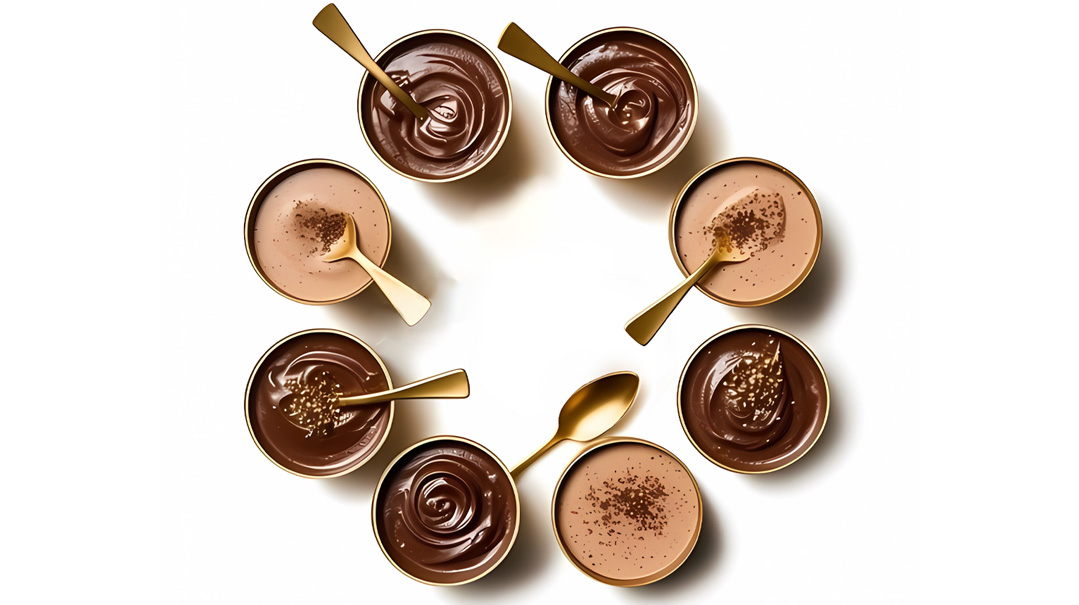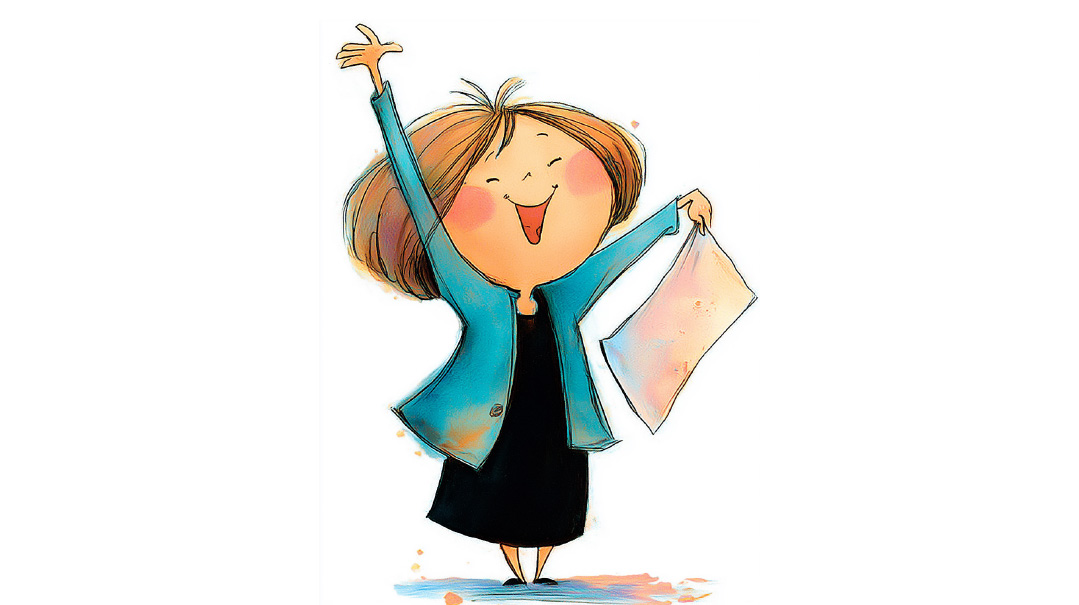Second Guessing: Just Desserts

My sister is encouraging my kids to disrespect me

I
’m in the middle of an intense allergy attack when my phone pings. I swipe around for it, eyes streaming. Eliyahu stuffs the Kleenex Puff into my hand, phone tucked into the little window on top. I blow my nose, dab my eyes, mutter ominously about how I’m going to kill all the dust mites in the whole world, and check my messages.
Voice note from Penina.
Hiiii Michal, how are you? Guess what, Mordy and his brothers are flying to Houston for their cousin’s son’s bar mitzvah, don’t ask, and I’m very not interested, so I had this great idea: What if me and the kids head down to Cleveland for Shabbos? Only if you’re up to it, absolutely no pressure, but it could be so fun. Let me know, thanks, kol tuv.
I roll my eyes at her kol tuv, like I do every time, and put my phone back down, Also, what’s with this “head down to Cleveland?” Is Lakewood the actual center of the universe?
I love my sisters, all three of them, and I’d be excited about spending Shabbos with Brachie and Chelli, but Penina just knows how to push every single one of my buttons. It’s not even what she says, it’s more how she says it. Like, this super caaaalm and slow way of speaking that apparently charms the entire world, but really just makes me want to shove cotton into my ears.
I know, I’m a horrible person. After all, I’m supposed to worship my big sister, right?
Ma always said, “Girls, be nice to each other, and one day you’ll be best friends.”
Uh, Ma? You’re always right, but in this case…. That’s not to say Penina and I don’t have fun when we see each other. But a whole Shabbos with just me and her can be a lot. This whole sisterly love thing is a mixed bag.
Eliyahu thinks I’m too hard on her, that she can’t help herself, but I think she kind of asks for it. I mean, I remember when you ate all the gushers and then told Ma it was Chelli, so don’t give me “helpful parenting tips,” ’kay? Oh, now I’m really being mean. People can change; I certainly have.
I sneeze four times in a row and run the idea of hosting my big sister and her five kids for Shabbos past Eliyahu.
The boys have an off Shabbos, so it’s going to be a full weekend. Which I can handle — hostess with the mostest here. But I also invited our cousin Tova and her family of six over for Shabbos day dessert, because if there’s anything Penina and I need, it’s a good buffer.
Miri is already hard at work in the kitchen by the time I get home from work.
I give her a kiss on the cheek. “The ratatouille smells amazing,” I say, washing my hands and grabbing a banana.
She smiles at me from under the hood of her seminary sweatshirt. I’m so glad she’s back; I missed her way too much this past year.
I wander into the dining room, kicking off my shoes and shrugging off my blazer.
“Tell me the boys are back without telling me the boys are back,” I say to my davening-jacket-bedecked dining room chairs and hat-studded table.
“They’re outside,” Miri calls out.
I flatfoot my way over to the porch door and crack it open. The boys are involved in a lively game of keep away. I watch them throwing and laughing, tzitzis flying, and my heart fills. They’re usually so serious; I love to witness this side of them. I back into the house silently. Let them play. There’ll be time to catch up later, when the Greenburgs get here.
I text Penina for her ETA and order Penina’s favorite sushi to arrive ten minutes after that. Our boys grill burgers out back. Penina’s Dovid fits in perfectly with Chananya and Shlomo, and the three of them sit on the deck long after dinner is over.
Penina wraps an arm around me and give me a quick hug as we relax on the couch. It’s close to midnight, but neither of us have koach to actually stand up.
“It’s so, so good to be here,” she says, and for a moment, I can forget our differences, forget the years of tension, and just bask in our nachas together, as only sisters can.
I hug her back.
Miri calls me from Kosherluxe. She’d left early with her cousins to pick up brunch, and I told her to pick up a special Shabbos dessert: mousse miniatures that cost an arm and a leg but are by far yummier than anything I can make.
“Ma, they came out with butter pecan mousse also, so do you want the chocolate or the new flavor?”
Omigosh, why does butter pecan mousse miniatures sound better than anything I’ve ever eaten in my life?
“Get both,” I say spontaneously, even though $80 on dessert is a bit extreme. But hey, how often does Penina come to Cleveland? Let her see that Lakewood isn’t the only town with geshmake gashmiyus.
Friday night is amazing. Penina and I stay up late, talking and laughing long after everyone is fast asleep. There’s just something about spending time with a sister, a feeling of safety you can’t get elsewhere. And maybe she’s changed? Maybe the years have softened her, made her less judgmental, because I find myself sharing so much more than I usually would.
Plus, who else remembers all your milestones and embarrassing phases with such surprising clarity? Baruch Hashem, no one.
Shabbos day starts out really nice. We linger over our coffee and cake, swapping magazines and arguing over the serials like someone has paid us big bucks to not only psychoanalyze fictional characters, but also solve all their — and society-at-large’s — issues.
The men come home, see we are nowhere near ready, and wander off for naps and chavrusas. It’s two when we’re finally ready for Kiddush. We gather round the table, and I survey the spread: four different salads in a rainbow buffet, plus a platter of both salmon and gefilte laid out. I’m pretty proud of it, thank you.
Penina elbows me. I turn to her, expecting a little “Wow.”
“I love that I’m witnessing the Klein time warp firsthand.”
I blink. Seriously?
“Penina, do you honestly think we start at two every week? It’s because you’re here! Which I’m so happy about it, but like hi, this is not usual.” I hear my voice rising indignantly, and I cringe at myself. “I run a very tight ship usually.” Oh, stop talking, stop talking, just stop.
Penina gives a patronizing half-smile, like she knows exactly what I was just thinking, and holds her finger to her lips as Eliyahu starts Kiddush.
I roll my eyes for good measure.
Of course, Tova and her kids show up right before I serve the main course, because we are running super late, but it’s fine, there’s space, and the more the merrier.
Dessert at long last. I pull a fruit charcuterie from the back fridge, slice the cakes, and Miri lays the miniatures on my favorite paisley platter.
I head back into the kitchen for nuts and popcorn when Penina materializes at my elbow.
“Psst, Michal!” She’s looking at me meaningfully.
I’m lost. “Yeah?”
“Those miniatures… you know it’s like some random hechsher, right?”
Omigosh, is she right? I was so careful, I double-checked every yogurt for chalav Yisrael and even told Miri to leave strawberries off the fruit platter.
I grab an empty box and squint at it. An intense feeling of relief washes over me. “Penina, this is a totally fine hechsher. I mean, it’s not like the big ones, but Eliyahu looked into it after the dairy keilim situation a few years ago, and it’s very reliable now. Besides, Kosherluxe wouldn’t sell anything questionable,” I say decidedly.
What is her problem? Why does she have to make every single thing so complicated? Like the way she was telling my Rena how in Lakewood, all the five-year-olds wear beautiful knee socks, with flowers and bows, and now Rena refuses to wear the $20 Shabbos socks I bought her for Pesach.
Penina shrugs and walks back into the dining room.
I come out several minutes later balancing bowls of goodies. Eyeing the table, my blood begins to boil. The fruit is almost gone, as are the biscotti and brownies. But the mousses are mostly untouched.
“Chananya,” I say, my voice unnaturally high. “Have a mousse, they’re your favorite.”
My eldest looks uncomfortable; his ears are bright red. “Uh, I’m good, Ma, thanks.”
I look at the other kids, each capable of downing four mousses any other time I’ve splurged on them. They all studiously avoid my eyes.
Why does this bother me so much? I’m an adult, graceful, poised, a good hostess. Why do I feel like slapping Penina across the face?
But I just smile tightly at her and Tova, and settle with them on the sofa. Tova, bless her soul, is happily eating a mousse cup. I nod and laugh and tsk at the conversation, but for one million dollars, I couldn’t have told you what Tova was talking about over the voice in my head calling Penina every petty name in the book.
Later, when I’m clearing off, running back and forth while Penina holds court like she’s the Grand Dutchess of Annoying Sisters, I spy Chananya spilling two untouched mousse cups into the sink.
“WHAT are you DOING?!” I shriek.
He looks genuinely stunned. “Ma, I thought we decided not to eat these?”
Out of the corner of my eye, I see Penina nodding.
And that’s when I lose it. “This is NOT your home, NOT your kids, and NOT your kitchen,” I hiss at Penina. “So just stay in your lane, okay?”
And when she mutters a cold, “Thank you for everything,” on Motzaei Shabbos and stalks out for the long drive home, I wonder what I could have done differently.
All I can think is: Should I have done anything differently?
Rosally Saltsman,
Petach Tikva
The thing with people who push your buttons, or judge you, or try to make you feel in some way inferior (knowingly or not) is that, try as you might, you cannot possibly predict and avoid every possible situation in which this can happen. It sounds like you took great care to be, as you say, “the hostess with the mostest,” providing good food, good company, and even a buffer to make sure there’s joy and harmony in your sister’s visit. It seems like you also were able to ride the first few waves of your sister’s criticism and deflect it, but she went a bit too far. Older sister or not, there are boundaries you’re not supposed to cross in someone else’s home. Not wanting to eat a certain hechsher is one thing, and her prerogative, but imposing that view on your whole family, which interferes with your chinuch, is quite another. Penina should have been at least a bit abashed by your reaction and apologized. Instead, she showed little gratitude for all you did for her. Of course, she has her own version of the story in which she did this for your own good. In other words, she was trying to continue her adolescent role, which she has long since outgrown.
I don’t think there’s anything you could have done differently, because you are living completely different lives in different places, with different priorities and standards, and, like you mentioned, this is a long-standing dynamic that you will be hard-pressed to change alone. I suggest the next time you get together, you spend time in a neutral place like a Pesach Hotel or a Succos retreat — but be aware that no matter how many precautions you take, there’s still going to be something you don’t foresee. And until Penina learns to respect your limits and know her place, nothing is likely to change.
Rosally Saltsman’s latest book 100 Life Lessons I’ve Learned So You Don’t Have To is available at Lulu.com and Amazon.com.
A. Lipschutz
Montreal, Canada
Wow! So you’re human, too?
While restraining ka’as (anger) is a middah of paramount importance, it is also wrong to let your anger bottle up, as this will eventually lead to a greater outburst, as it did in this story. Working on controlling anger means learning to not allow others’ actions to affect you at all. Thus, the real work on this middah needs to be done ahead of time, with an integrated mussar approach. This is the work of a lifetime. Until you reach those heights, your reaction in the face of such provocation was completely normal and perhaps justified.
All I can add is that people who put others down are generally insecure about their own selves. Your sister is obviously not in the best place; her putting you down is only a tool to try to make herself feel better. Understanding this might have helped you to view her with pity rather than anger.
Esther S. Stark
Monsey, NY
Many of us have a tendency to push away emotions and situations that make us feel uncomfortable. The downside of pushing aside your feelings is that avoidance does not make them go away.
Michal immediately experiences tension when Penina reaches out, but she doesn’t take the time to acknowledge her feelings and work through them. Her old insecurities around her big sister lurk beneath the surface and come forth in a way that feels awful in the end.
What Michal needs to do differently is challenge the validity of the old dynamics between them. She is an adult now, and she is good enough by her own standards. Being confident from within would help her see untouched mousse cups as a reflection of Penina’s mindset and personality, rather than a threat to her personally.
(Originally featured in Family First, Issue 848)
Oops! We could not locate your form.







